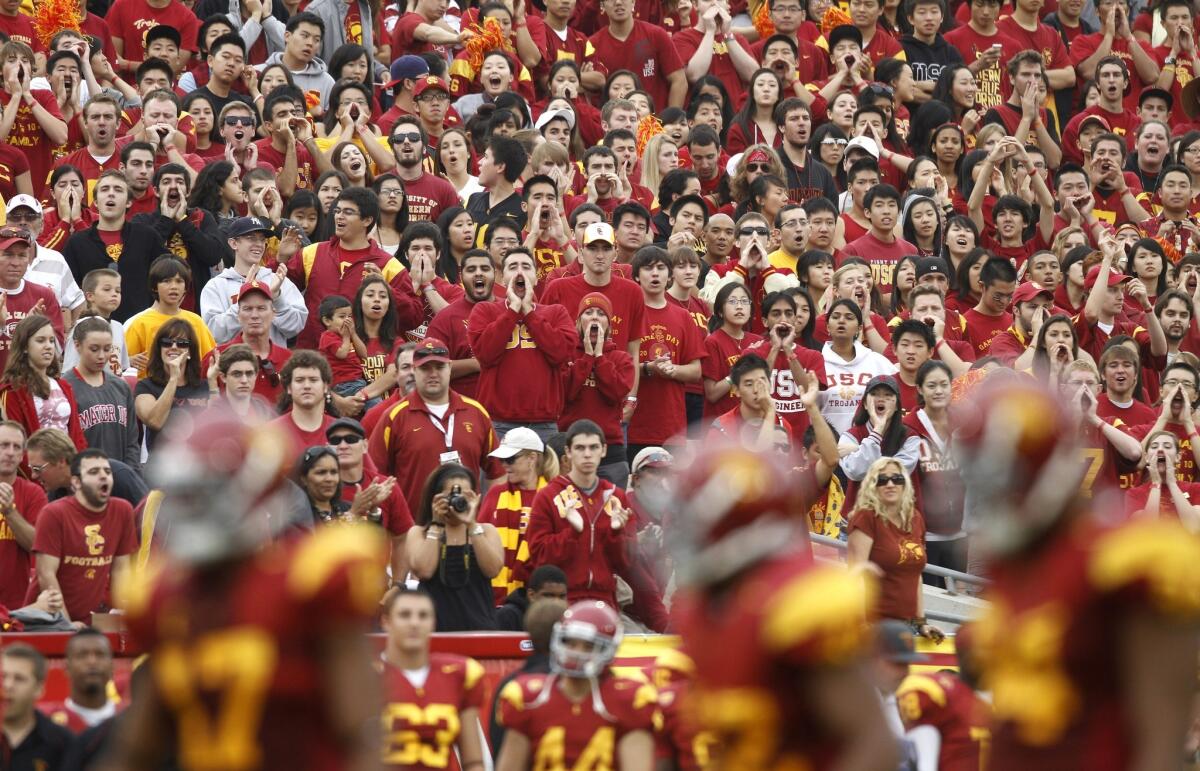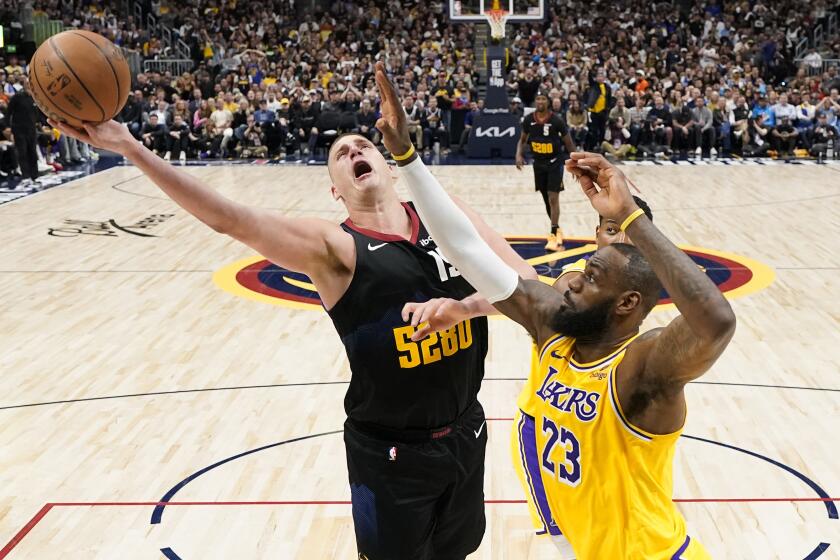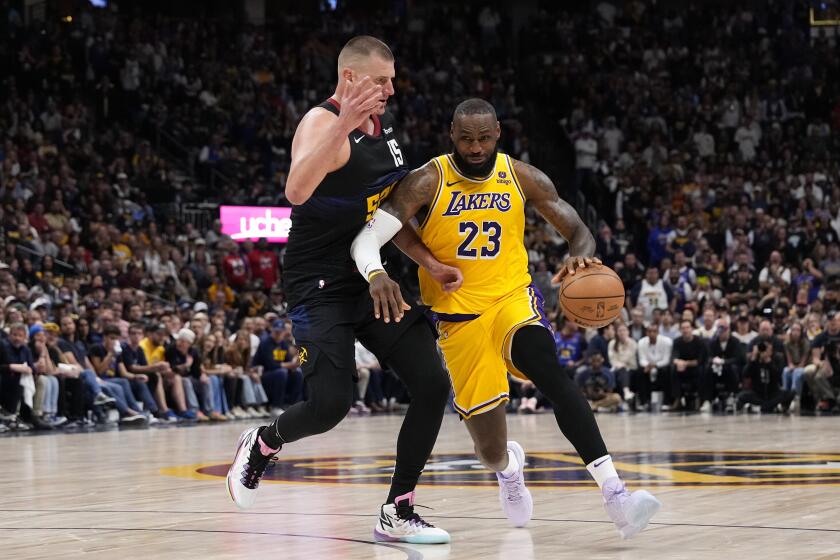These brokers deal in sports tickets — and risk

Dale Rech, an avid USC football fan who lives in Florida, decided a few years ago that he wanted to attend USC’s game at Notre Dame. Rech dived into the secondary ticket market, choosing StubHub. He was willing to pay a premium.
“The seat I ended up buying had about a 300% markup,” Rech said. “To me it was worth it. And it was a good seat.”
Skip Elefante, a Tustin businessman, regularly deals with StubHub and other secondary ticket marketers to both buy and sell tickets. He sells his tickets for what he paid and sometimes sees his ticket go for well over market value. Sometimes he sees his ticket go unsold.
“Either way, I’m out of the risk business,” Elefante said. “That’s what the secondary market is for.”
Secondary markets are mostly Internet sites such as StubHub, TicketExchange by Ticketmaster or Barry’s Tickets, which advertises heavily on Los Angeles sports talk shows. They buy from ticket holders, mark them up and sell them over the Internet.
There’s no question the safest — and most common — way to buy a ticket to a sporting event is to go directly to the team.
But that’s not always easy or even possible if the team is historically good and most of the tickets belong to season-ticket holders. Those cost thousands of dollars, even for upper-level seats, and who has that type of cash or even wants to attend every home game of their favorite team?
Then there are those guys, almost always guys, who stand in front of the arena waving two, four, six, tickets in your face. “Got four, want four?” they’ll say not too loudly, but loudly enough to get your attention. Such transactions feel shady and are sometimes illegal and the purchaser has no way to knowing if the tickets are legitimate.
It’s no fun forking over a couple hundred bucks, getting to the door and being told the tickets are fake.
And wouldn’t you know it? You’ve already paid for parking.
The something in between is the secondary market. There is even an organization, the National Assn. of Ticket Brokers, that gives its seal of approval to secondary market sites.
Some teams are upfront and deal with specific vendors. If you buy a USC football season ticket and know you can’t attend all the games, USC urges you to sell to StubHub, one of the largest marketers.
For two years, Major League Baseball had a similar deal with StubHub, though now it is left to individual teams to make their own deal or not.
Marianne Jennings, a professor emeritus at the W.P Carey School of Business at Arizona State, has done several studies on the secondary market.
She said the market is a natural outcome of the fact that teams underprice tickets.
“The primary market is invariably underpriced,” Jennings said. “But the team or concert sponsor makes money on ancillary things such as parking, concessions and souvenir sales.”
Fans who seem puzzled when ticket prices rise and fall daily on sites such as StubHub, Ticket Exchange, Ticket Liquidator, SeatGeek and FanSnap, shouldn’t be surprised, Jennings said.
“It’s a little like the airline ticket market,” she said. “You could be sitting next to a guy who paid $200 for his ticket and you paid $400.
“That’s the market being itself. It’s transparent and it’s a free market. It’s up to the fan to do research and make a rational decision.”
Jennings also said that the brokers who work for the secondary markets have particular talents.
“There is no ‘usual’ markup,” she said. “The ticket broker is the real risk absorber in the whole system.
“They purchase in the primary market at the going rate and use their experience to figure out what demand will be. If they are wrong and a team’s fortunes shift, they absorb the loss.
“Many brokers buy season tickets for dog sports teams to have them for when they might have winning years. Brokers are often the bread and butter for sports teams in their lean years. Brokers are really risk-takers.”
Some teams are beginning to act almost as their own secondary ticket brokers.
For example, Stanford football is doing something it calls “dynamic pricing.”
Cardinal spokesman Kurt Svoboda said that tickets for the Notre Dame, California and Oregon games will be sold using this system.
From Aug. 1 to 4, Stanford will sell tickets to those games for $115 and every three days the price will drop $10 until Aug. 12 when they will cost $85. After that, Svoboda said, “Tickets will sell at a certain market price. We’re trying to make this a predictable model that is extremely transparent.”
Jack Groetzinger, a Dartmouth graduate and a co-founder of SeatGeek, a ticket liquidation Internet site, said he got into the business because “I was inspired because there was an apparent dearth of market data being used to determine what the true price of tickets should be.”
As recently as 10 years ago, teams didn’t want us to exist,” Groetzinger said. “More recently they’ve embraced the secondary market. It’s very much a reversal.”
Tim Harris, vice president of business operations and marketing for the Lakers, agreed. “Years ago the secondary market made teams nervous,” Harris said. “You were dealing with a lot of scalpers standing outside.
“Now brokers such as VIP Tickets, StubHub, Barry’s, these guys are more institutional, often licensed and they provide a service.
“In the old days you might have a customer who had bought season tickets and at the end of the year opened his drawer and saw a stack of 15, 20 tickets he hadn’t used and he was mad. You don’t want an angry customer. Now the customer can work with a secondary broker and trust he’ll be taken care of. Teams are now actually encouraging that.”
Harris Rosner, co-founder of VIP Tickets and an officer for the National Assn. of Ticket Brokers, said people need to be careful if they go to websites such as LivingSocial.com or Craigslist that deal not only in the resale of tickets but of just about anything else.
“You just don’t know what you’re getting there so even if the price of, say, a Dodger ticket is $10 cheaper than a legitimate secondary source, you have no way of knowing if the ticket is legitimate,” Rosner said.
Several ticket brokers who spoke on the condition of anonymity because they weren’t authorized to speak publicly about financial information, said most brokers purchase tickets at face value because they are assuming the risk.
The markup is determined by their knowledge of a particular market and games. If a ticket goes unsold, one broker said, “We’re just out of luck and out of pocket.”
Schools and teams get no profit and no risk when fans use the secondary market. They’ve just got the profit from the originally sold ticket.
Alison Salcedo, a spokeswoman for StubHub, said inventory on her site can also come from someone who bought a mini-package and suddenly can’t go or someone who just wishes he or she had the money back.
“I know tennis fans who want to go to the U.S. Open and want tickets as soon as possible, and others who want to go just as much but who will wait until the very end, and a few who find out at the last minute they’ll be in New York and decide to go,” Salcedo said.
When a consumer purchases a ticket off a website, Salcedo said, he gets a PDF copy of the ticket faxed or mailed.
Steve Lopes, senior associate athletic director at USC, said the secondary ticket market is something that can’t be ignored. “It’s a thriving enterprise,” Lopes said. “We have ties with StubHub. We want our customers to be assured the tickets they’ve purchased aren’t counterfeit.”
As in any good rivalry, UCLA uses a different company.
Scott Mitchell, UCLA’s associate athletic director for marketing and business development, said UCLA has a relationship with Ticket Exchange.
“It’s become much more common,” Mitchell said of the secondary market. “The world’s changing and we’re monitoring what Stanford is doing with dynamic pricing.”
Mitchell said the only bad thing when a UCLA fan purchases a ticket on the secondary market is that Mitchell will never know the name of the person. “We can’t market to them any other product,” Mitchell said. “We can’t try to sell them anything else.”
For the consumer, maybe that’s the good news.
Twitter: @mepucin
More to Read
All things Lakers, all the time.
Get all the Lakers news you need in Dan Woike's weekly newsletter.
You may occasionally receive promotional content from the Los Angeles Times.






